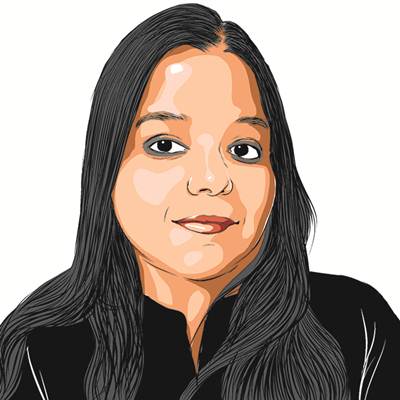Sans any space to move their elbows or legs, a motley group of around 20 students sit crammed in a small, makeshift classroom at Punjabi University campus, a reputed state-run university in Punjab’s Patiala. A technical assistant keeps them engaged with some slides displayed on a projector as there’s no qualified faculty for their course.
Established more than three years ago, the Patiala campus’s Centre for the Empowerment of Persons with Disabilities is currently crippled, and at the receiving end are a group of 20 students who have taken admission in its newly launched course — now forced to “attend classes” without any proper classroom space to sit or faculty to teach.

It has been over a month now that classes have commenced for the newly launched four-year integrated course — BA-BEd HIFS (Bachelors of Arts and Education in Hearing Impairment Foundation Stage) —- with the first batch of 20 students but neither there are proper classrooms nor any faculty to conduct the classes. The special course, aimed at creating special educators to teach children with hearing impairment in future, has been started after the approval from Rehabilitation Council of India (RCI) but without required infrastructure and specialised faculty.
Story continues below this ad
Not even having its own building, the Centre for Disabilities is currently running from the building of ‘Centre for Sufi Studies’ where two rooms have been vacated and the books from the Sufi Studies library are now lying dumped in the corridors.
Fighting the lone battle for this “special centre” which was created with an aim to “promote higher education for specially abled students” is a woman who can understand this pain well. Sitting at her one-room office which she shares with her three other staff members, Dr Kiran, a visually impaired assistant professor of Sociology and the brain behind the creation of the centre to empower disabled students, is waiting for the varsity authorities to fulfil their “promise” and hire special faculty for the course.
Remembering her struggles of the past seven years, Kiran shares how she had to run from pillar to post, first to get the centre established in 2021 and then to get RCI approval to start the course.
Appointed as the coordinator of the centre, Kiran tells The Indian Express: “We had started the course only after I was promised that special faculty will be hired and classrooms will be allotted. I know it is disheartening for students too as they took admission in the new course with high hopes. The university has promised us that we will get classrooms soon and faculty will also be made available to teach course subjects. Till then, I am trying to teach the students about disabilities to the best of my own knowledge.”
Story continues below this ad
 Visually impaired Dr Kiran signs documents with the help of her staff.
Visually impaired Dr Kiran signs documents with the help of her staff.
The Punjabi University, Patiala, claims to be the only state varsity in Punjab to offer such a course, which includes graduation in Arts and Education, but with special training to teach hearing impaired children in future.
“Along with the faculty to teach basic arts subjects such as economics, languages etc, we also need two assistant professors specialised in hearing impairment (to teach sign language) and who should have postgraduate degree in special education. We might engage guest faculty if regular ones are not hired,” she adds.
The professor’s life is a textbook example of why the persons with disabilities should be provided ample opportunities to pursue higher education and given the required guidance. After losing vision in both eyes at the age of 19 due to an illness, she had to leave her BSc (nursing) degree midway. But she refused to give up on life. She then pursued English Stenography in Braille and went on to complete her graduation (BA) from Panjab University (PU), Chandigarh. She then pursued Masters in Sociology from PU and stood second in the university. She did not stop there as she further cleared UGC-NET to become an assistant professor and then earned her PhD with specialisation on Studies on Visual Impairment, also from PU.
Currently working as an assistant professor at the Department of Sociology and Anthropology, the professor took it on herself to get established a special centre in the campus to empower students with disabilities, and mooted a proposal in 2018 when she was nominated as a member of state advisory board for persons with disabilities run by the Punjab government. “Finally in 2021, we got the approval and a one-time grant of Rs 55.60 lakh for basic set-up,” she says.
Story continues below this ad
However, over three years later, the university is yet to fulfil the basic requirements for the centre, including a proper building of its own, classrooms and faculty.
Started from this session, the RCI has only granted “conditional approval” for the BA-BEd HIFS course, and if the university fails to fulfil mandatory conditions such as classrooms, faculty and accessible washrooms, then the approval can be revoked after the RCI inspection and the course might be shut.
“Though currently none of our 20 students in the course are disabled, still it is mandatory to have accessible washrooms in the centre as one of RCI’s conditions to facilitate disabled students or faculty who might take admission in future,” says Kiran, who has taken on double responsibility — teaching her own students at Sociology department and taking extra classes of these 20 students at the Centre for Disabilities till their own faculty doesn’t join.
Assisting her in keeping the new centre running despite all hardships are her staff members — technical assistant Simranjeet Singh and clerk Hardas Singh (both having physical disability), superintendent Veerpal Kaur and a peon Manmohan Kaur — all sharing one small room in the name of office space.
Story continues below this ad
“In 2023, Punjab Education Minister Harjot Singh Bains had promised that our centre will be strengthened further and more funds will be given to make it a full-fledged department so that no disabled student remains without higher education. But we are still waiting for those promises to be fulfilled,” says Kiran, as she signs documents with assistance from her staff.
Among 20 students in the newly launched course, three are from neighbouring Haryana. Speaking to this correspondent, students said that they and their parents had hoped for better prospects when they took admission in such a reputed university. “But till now, it has been a complete disappointment. There are no classrooms, no faculty. If they had no arrangements, why was the course started,” a student asked.
Jaswinder Singh Brar, dean, academic affairs, Punjabi University, Patiala, said: “We are committed to providing all basic facilities to all our students. This centre is our special project. They will get classrooms and teachers soon. We will engage guest faculty having required qualification.”
Kiran, who doesn’t mind climbing stairs multiple times a day to teach her Sociology students and then again returning to the centre to counsel the new students, says: “We are always told we are special but it seems it is only on papers. But the special treatment is yet to be seen practically. I will keep fighting for the rights of disabled students as I do not want any of them to suffer the way I did. It’s their right.”


 Visually impaired Dr Kiran signs documents with the help of her staff.
Visually impaired Dr Kiran signs documents with the help of her staff.






